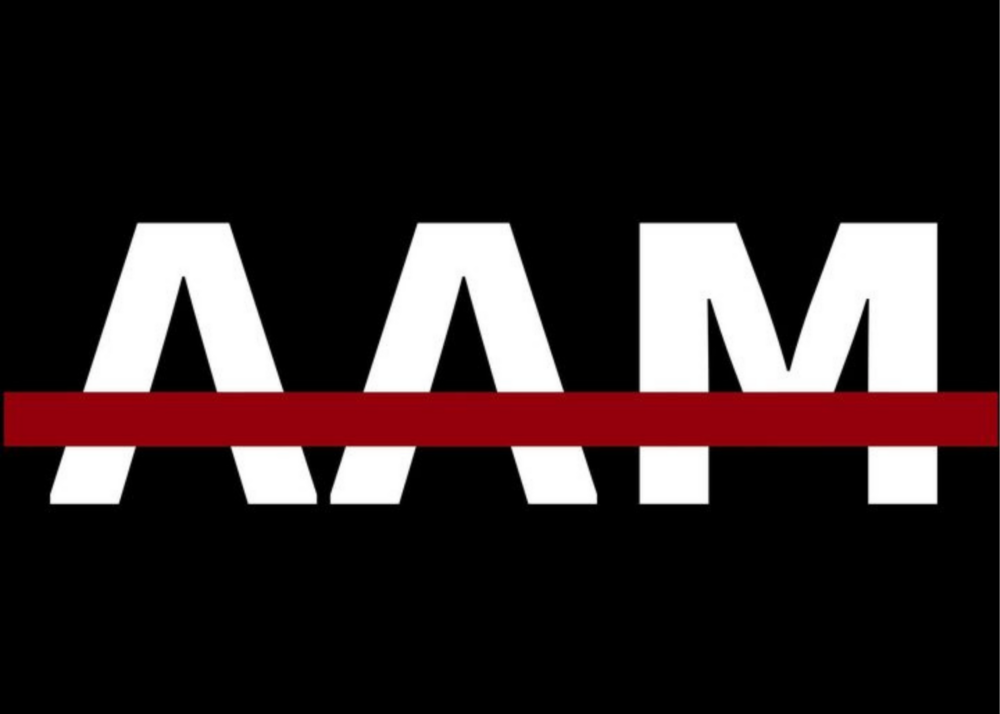
When Animal Rights warriors– Shannon Blair, Trey Morrow, and Mikee Yago, had to curtail their street activism during the COVID-19 pandemic, they were inspired to rethink strategy to remain impactful. After rigorous brainstorming, they found a solution. They were going to grow the animal rights movement by empowering new activists to harness their unique skills and join the animal liberation cause. Thus, in April 2020, the Animal Activism Mentorship (AAM) Program was born. Mikee points out, “It is often quoted that only one percent of the world’s population is vegan, and not all vegans are animal rights activists. If we could motivate more people to use their voice, we would have a stronger impact.”
From their personal experiences, the AAM co-founder team understood the importance of having guidance when embarking on their activism journeys. “It’s so easy to feel overwhelmed and unsure of where and how to get started. We want to help new activists bypass that initial slump, and help them find their footing as activists,” says the terrific trio!
They graciously chatted with VEGWORLD about AAM’s ambitions and global actions- fighting the good fight for ALL Earthlings.
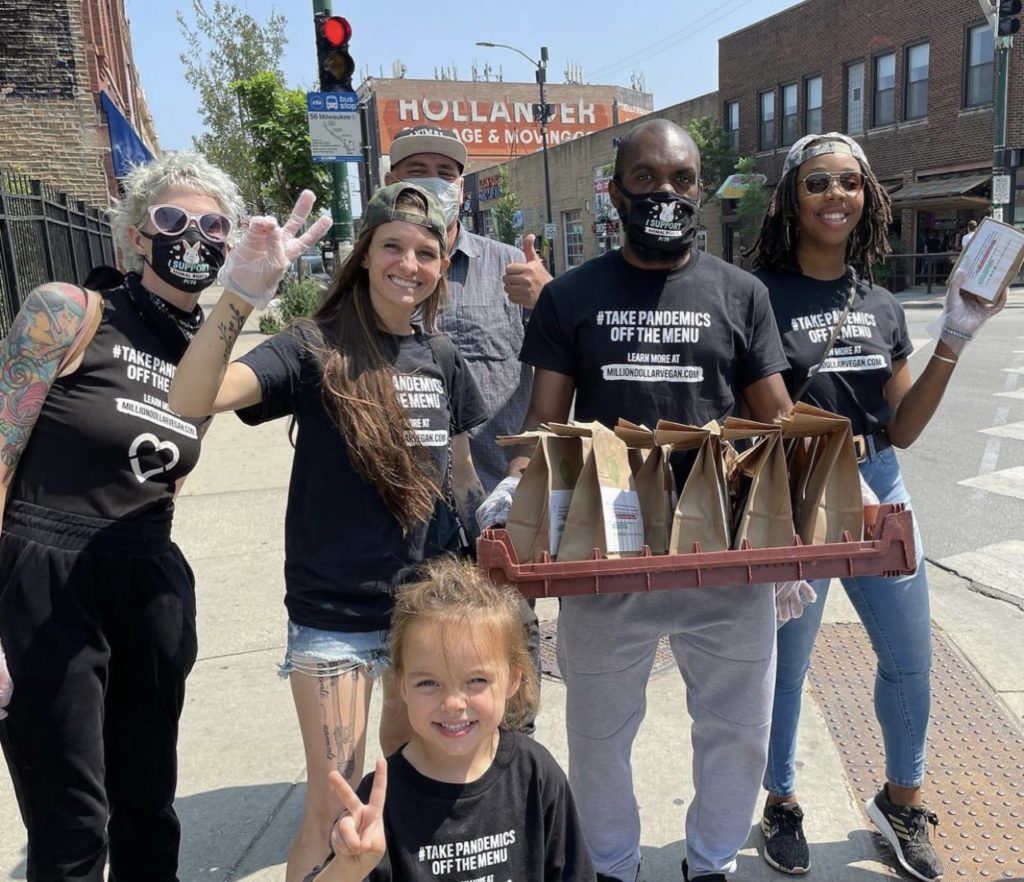
VW: How would you describe AAM and its purpose?
AAM: AAM is a program with a mission to motivate and empower animal rights advocates to create a positive systemic change for all animals. We want to encourage new and seasoned activists to learn about different kinds of activism and decide what they feel called to participate in. We don’t believe that there is only one single most effective form of activism. Keeping that in mind, we created this mentorship program where we pair an interested, aspiring activist, who signs up for mentorship, with an experienced mentor in the kind of activism that they want to learn about.
VW: Throughout history, we have seen non-vegan activists join movements for companion animals, those used in entertainment, experimentation, etc. On that note, is veganism mandatory to participate in AAM?
AAM: Being vegan is not mandatory to be an AAM mentee. While AAM encourages everyone to be vegan, we will not turn away someone who wants to help animals. What is mandatory is that the member cares– which is apparent given that they signed up for the program! After that, a mentor will be paired with them to help them on their journey. Veganism is a part of that journey – whether they came into the program as a vegan, or are being introduced to how the lifestyle aligns with their commitment to animals.
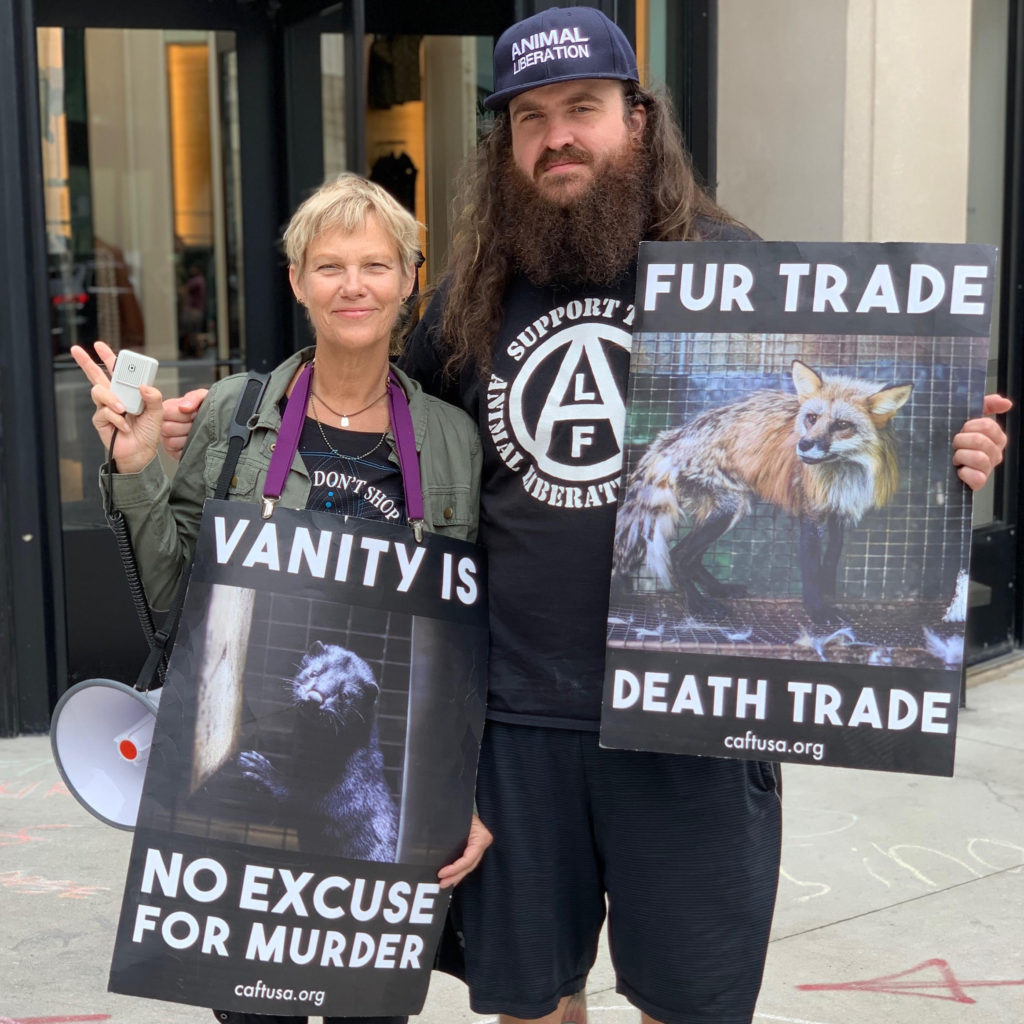
Trey with his incredible mentee- Julie 
Mentor Kristy meeting her mentee Emilly for the first time! 
Mentor Malania and mentee Andrea chat all things activism over a vegan meal.
VW: What do you feel is a significant hurdle for animal rights activists- seasoned and new?
AAM: We feel understanding and navigating individual circumstances can pose a challenge. There is no “one-size-fits-all model,” and what works for one, may not necessarily be effective for another. It’s easy to overlook this fact and stay committed to a specific strategy that may not resonate with others.
With new activists, there can be a sense of hesitancy and worry about judgment from others, or not knowing how to get started. Depending on where one lives, access to an animal rights community can be virtually non-existent! It’s a different story and entry point to activism for different people. That’s why our mentors create a custom mentorship for each mentee. No matter the obstacle one has, we hope our program can help overcome it to better help animals!
VW: As you mentioned, different activists can have different opinions on effective advocacy. How do you handle conflict and disagreements within AAM when planning actions?
AAM: Conflicts and disagreements are a part of any social justice movement. Within AAM, we recognize that there will always be a difference in opinions – may it be between mentor and mentee, or even between mentors. However, we make sure that we put forth that AAM is a space for education. Conflict resolutions are exercised, and different views are explored and evaluated – as a team.

VW: You’ve pointed out the need for more vegans using their voice for animals. How do you encourage vegans’ participation in activism?
AAM: We think it’s important to remind people that veganism does not save animals, it simply spares them. Veganism is the moral baseline, it just means you are not participating in the violence. To say that someone saves animals by being vegan is like saying someone is a lifeguard when their only credential is that they don’t actively purposefully drown people. That doesn’t make any sense. To fight for change, save animals, and work toward animal liberation necessitates action. Sometimes, the worst thing we can do is doing nothing at all. We feel the majority of the population would take action in some way, shape, or form. This especially resonates with ethical vegans- they know they would seize the opportunity to take action for the animals. However, the opportunities to do so might not be apparent to them yet. This is where AAM can help them exercise their values in a form of deliberate action.
VW: As an AAM member, what kinds of events can one expect?
AAM: Any mentor can organize an event through AAM. We have organized online workshops that discuss a variety of topics, host guest speakers, multi-day street activism events, training events, and also collaborate with animal rights groups and their campaigns globally. Our social media content emphasizes education and quick calls to action for various pressure campaigns. It’s an eclectic program, which we hope has something to offer for every individual!
During our multi-day events, we do our best to offer a variety of activism styles such as outreach, pressure campaign protests, and disruptions, animal rescue, vigils, chalking, leafleting, and more. Sometimes we even split up and do different events simultaneously so that people can choose what they think is more effective or what they want to try out. We always try to have a learning and empowerment element with all of our actions if we can. If someone tries a form of activism and it’s not for them, that’s okay too.
VW: Tell us about the program model- you are committed to a non-hierarchical framework. Why do you feel that is a crucial element for AAM?
AAM: Some organizations need hierarchies to meet their goals and that’s fine, but working without a hierarchy has been working well so far for our program. We feel it empowers each mentor to take initiative and make their own ideas happen. They can use AAM as that platform so that they have the support of other mentors to help them succeed.
One challenge of any non-hierarchy is staying organized and keeping the needle moving. Our solution to this is what’s called the Support Team: a small group that keeps us running with everything from pairing mentees with mentors, running social media, scheduling meetings, and serving our mentors in any way they need. Our model also avoids the “wait for instructions” bottleneck that can often hinder efficiency.
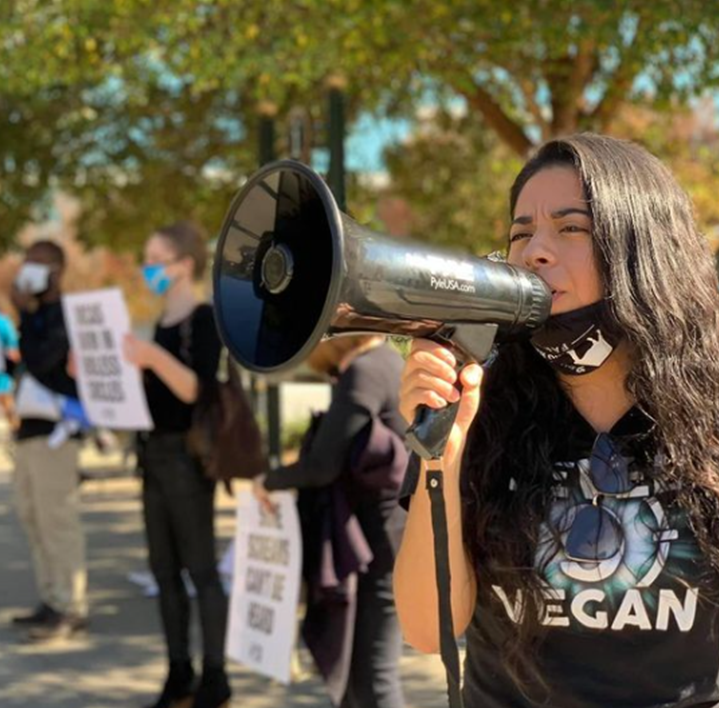
VW: That’s a smart evaluation! Moving on, what has been the most meaningful and/or hopeful experience with founding AAM?
AAM: There has been a lot of learning, but what has stood out to us is the need in our movement for something like what we have built- the sign-up numbers show that. Since we started in April 2020, we have had hundreds of people sign up to be mentors and be mentored. We expect the sign-ups per year to keep increasing. There are so many people with a will and a drive to help animals, but they have no idea where to start. Some people need help finding other activists in their local community, some need help finding the kind of activism they want to do. Some just need a little word of encouragement to validate their already-good ideas and then they get to work. Some already know exactly what they want to do, they just need some kind of support system. That’s what we try to provide. Seeing more sign-ups seeking mentorship, and more volunteers to be mentors gives us hope!
VW: As activists, how do you balance the heaviness of the work with taking care of yourselves?
AAM: We at AAM prioritize the importance of rest, self-care, and well-being of activists. The fear of not doing enough for the animals is a constant concern. The endless exposure to the suffering of trillions, feeling misunderstood, the mental, physical, and emotional fatigue are not to be taken lightly. The fight for liberation is a long one- a marathon and not a sprint. That means that taking care of ourselves is necessary. Taking breaks is necessary. We are thankful to have a supportive, uplifting community- human, and non-human. It’s also important to take time to explore personal hobbies and prioritize vital rest and nutrition. It keeps the crew charged, revitalized, and ready to fight the good fight for animals!

VW: So many commendable achievements in so little time- kudos to the entire team! Looking forward, what do each of you envision in AAM’s future?
Shannon: I am dedicated to seeing AAM in every country and being a key resource for activists across the globe. We have so many amazing plans in the works- from creative workshops to more collaborations with veteran organizations. Perhaps if we show the people who genuinely care about animals that getting active is a cool, badass way of changing the world, they would be empowered to join the movement! They know it’s the right thing to do and I see AAM as a program that demolishes all the roadblocks and encourages the animal lovers out there to join the just cause.
Trey: I envision expanding into more countries, putting on workshops in languages other than English, organizing in-person events in countries other than the United States, and continuing to grow this community where we learn from, inspire, empower, and support one another. A sense of community is so important to keep us all going.
Mikee: I can see AAM evolve into a well-recognized focal point for animal rights activism that is easily accessible. However, looking ahead beyond that is bittersweet. Maybe one day, AAM will be nothing but a part of history…… because the world would not need a program to help them get active for the animals. We will have achieved a compassionate, vegan world.
All: We are also honored and excited to be fueled by Farm Animal Rights Movement (FARM)– the world’s first and longest-operating farmed animal advocacy organization. Collaborations with such esteemed organizations are bound to fuel, accelerate, and enhance our efforts!

VW: That was so beautifully said, and you’re all doing remarkable work! How can our community support your efforts?
AAM: People can support us by following Animal Activism Mentorship on Facebook, Instagram, and YouTube. Sharing our content and spreading the word is helpful because it encourages people to sign up for our program and become effective activists! Our content and resources are available for all to utilize and helps us broaden our reach through education. We would also encourage the public to start a mentorship program of their own too if their passion calls for it. This is not a competition anyway- we just want the animals to be free.
Lastly, whenever we are planning multi-day events, we do Facebook fundraisers. Contributing helps finances not be an issue for those who want to come to get hands-on activism experience with the support of experienced activists. Being a part of these actions helps people to get more involved when they go back home because they have the tools, experience, and a network of experienced activists to consult. These events are so crucial and by contributing, you can make them possible!
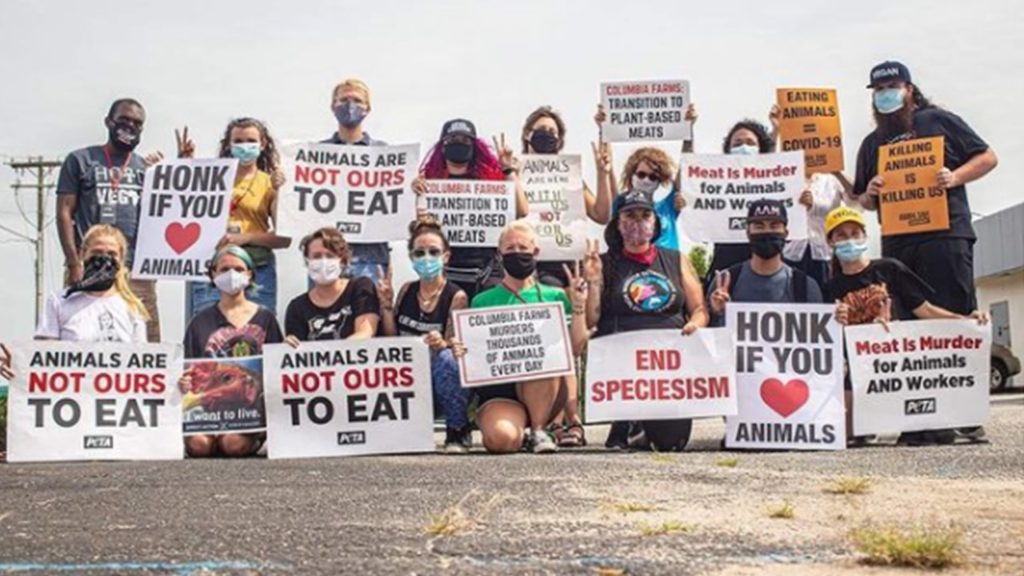
If you are ready to find your unique activist voice, you can sign up to be a new mentee with Animal Activism Mentorship’s program! You will be paired with a mentor and find a vibrant community of passionate activists who will inspire you to put your best self forward for the animals!

